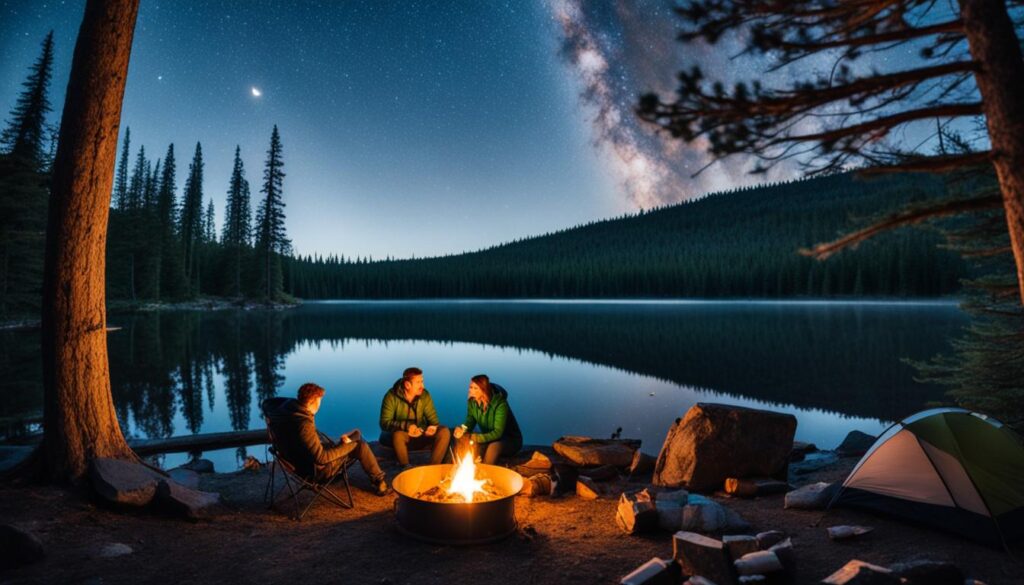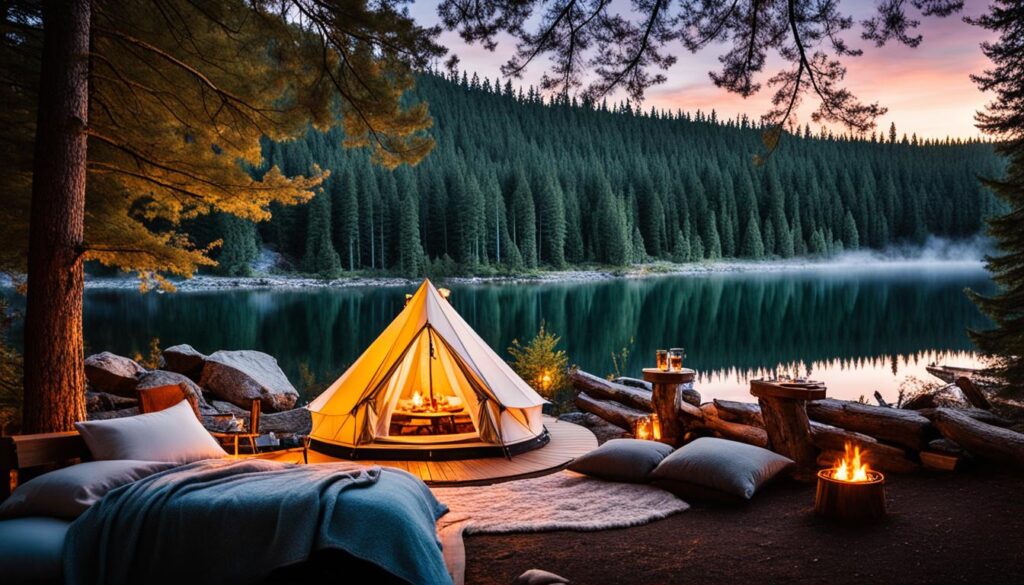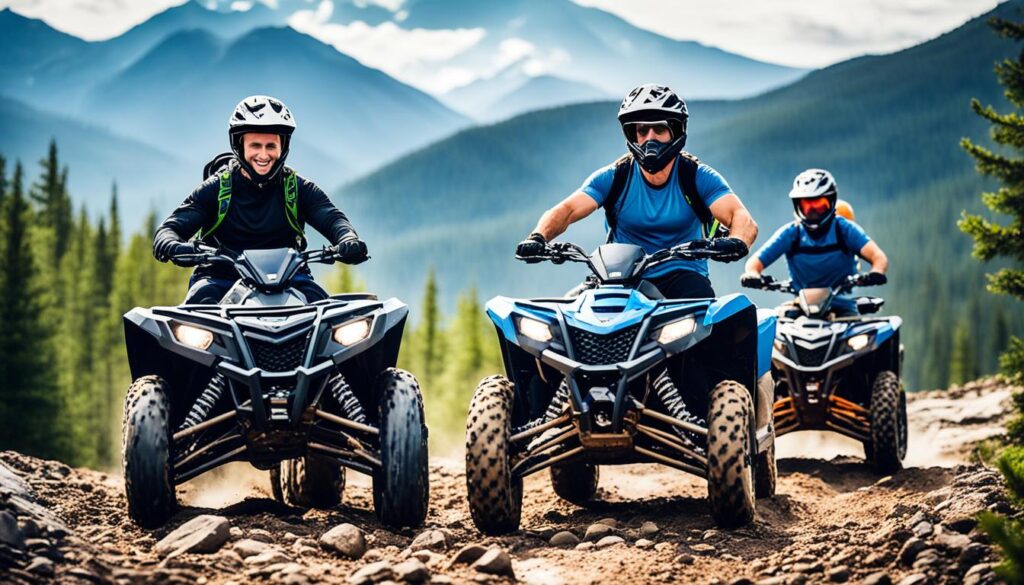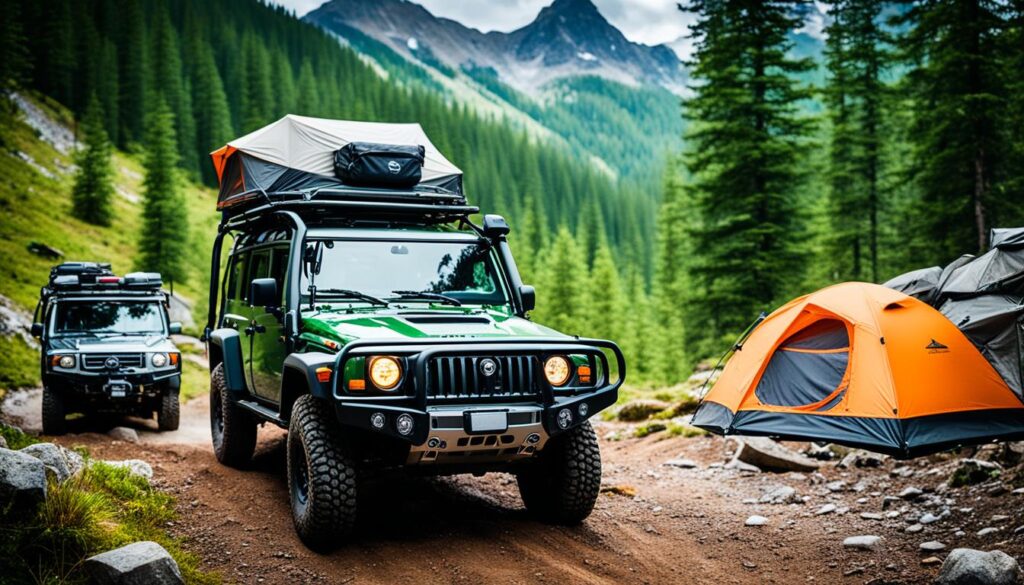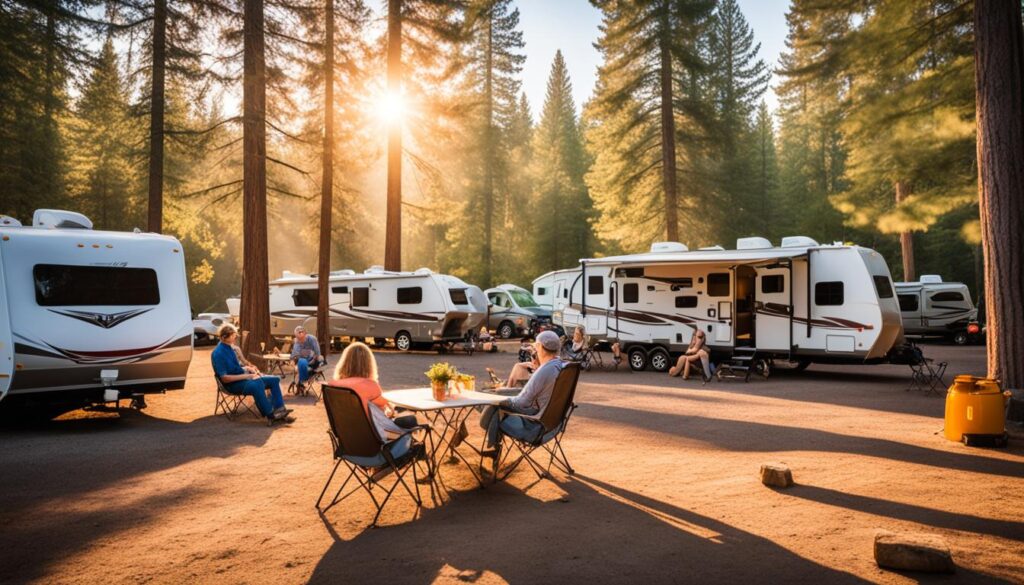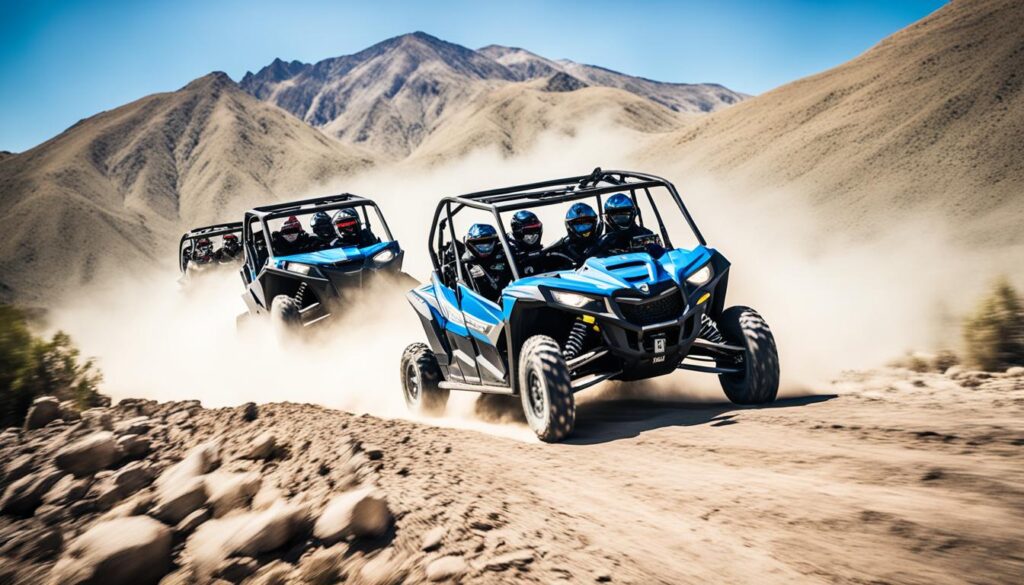Welcome to the Essential Camping for Beginners Guide & Tips! If you’re new to camping, you’ve come to the right place. Camping is a fantastic way to disconnect from the hustle and bustle of daily life and reconnect with nature. Whether you’re looking to relax or embark on exciting adventures, camping offers something for everyone.
As a beginner, it’s natural to have questions and concerns. But don’t worry, with a little planning and preparation, you’ll be well on your way to a successful camping trip. In this guide, I’ll share with you some valuable tips and tricks to ensure your first camping experience is enjoyable and memorable.
Key Takeaways:
- Plan your camping trip in advance to ensure a smooth and enjoyable experience.
- Familiarize yourself with camping basics and essential gear.
- Choose the right camping location based on your preferences and needs.
- Follow camping safety tips and guidelines for a safe and responsible trip.
- Don’t forget to have fun and make lasting memories in the great outdoors!
Contents
- 1 How to Start Camping
- 2 Tips for Pitching a Tent
- 3 Tent Camping vs. Lodging Options
- 4 Choosing a Location for Your First Camping Trip
- 5 What to Know Before You Go Camping
- 6 Camping Gear: What to Bring On Your Camping Trip
- 7 At Camp: Be Aware While You're There
- 8 Food and Water
- 9 Additional Camping Essentials
- 10 Conclusion
- 11 FAQ
- 12 Source Links
How to Start Camping
A good camping shelter is simple to use and able to keep you dry, warm, and safe. How to camp comfortably and safely depends on how you choose to stay — in a tent or an alternative lodging option. Tents are a popular beginner-friendly option because they are portable and adaptable. You can find tents in various shapes and sizes, with varying degrees of weather protection and insulation. Some are designed with solo travelers in mind, while others have multiple rooms for the whole family. Before choosing a tent for your first camping trip, consider your needs, the weather conditions, and your experience level.
It’s also important to have a camping checklist to make sure you have all the essential gear for your trip. Here are some camping essentials for beginners that you should include:
- Tent: Choose a tent that suits your needs and provides adequate protection.
- Sleeping bag: Ensure you have a warm and comfortable sleeping bag for a good night’s sleep.
- Sleeping pad: Invest in a sleeping pad to add an extra layer of comfort and insulation.
- Camp stove: A portable camp stove will allow you to cook meals easily.
- Cooking utensils and cookware: Pack essential cooking utensils and cookware for preparing meals.
- Headlamp or flashlight: A headlamp or flashlight is essential for navigating in the dark.
- Water filter or purifier: Ensure you have a reliable water filter or purifier to access clean drinking water.
- First aid kit: A well-stocked first aid kit is essential for treating any minor injuries or ailments.
- Fire starter: Pack a fire starter kit to make it easier to start a campfire.
- Extra clothing and layers: It’s important to dress in layers to stay comfortable in various weather conditions.
- Toiletries: Carry essential toiletries such as toothbrush, toothpaste, and toilet paper.
- Insect repellent: Keep insects at bay with a reliable insect repellent.
By having these camping essentials for beginners and following a camping checklist, you’ll be well-prepared for your first camping trip. Remember to choose a tent that suits your needs and consider the weather conditions. Camping can be an amazing adventure, and with the right gear, you’ll be able to enjoy the great outdoors comfortably and safely.
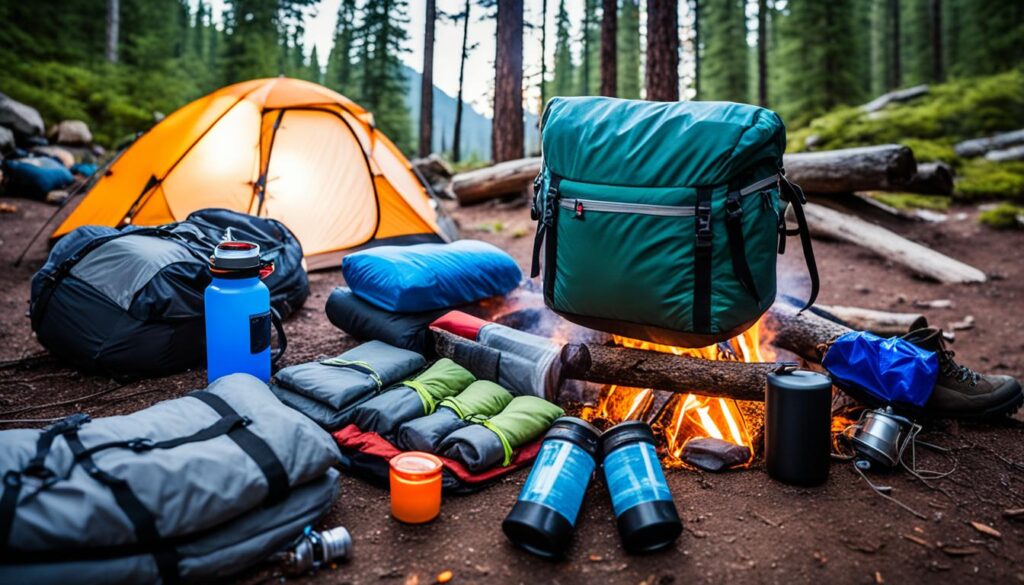
Tips for Pitching a Tent
When it comes to camping, knowing how to pitch a tent correctly is essential for a successful outdoor experience. Follow these tips and guidelines to ensure a safe and enjoyable camping trip:
1. Know Your Tent
Before setting up your tent, familiarize yourself with its design and assembly instructions. Each tent is unique, so understanding the specific features and setup process will make the pitching process much easier.
2. Choose a Level Spot
Find a flat and level area to pitch your tent. Clear away any rocks, sticks, or debris that could make sleeping uncomfortable. Avoid pitching your tent in low-lying areas or near water sources to prevent flooding.
3. Mindful Tent Stakes
Use sturdy tent stakes to secure your tent to the ground. Make sure they are properly inserted, angled away from the tent, and securely fastened. This will help stabilize the tent, especially during windy conditions.
4. Additional Protection with a Tarp
For added protection against moisture and ground dampness, lay a tarp or groundsheet beneath your tent. This will help keep the inside of your tent dry and protect the floor from sharp objects.
5. Enhance Comfort with Accessories
Consider adding accessories to make your tent more comfortable. Install a window for better airflow and natural light, or use a tent fan for ventilation on hot days. These small additions can greatly improve your camping experience.
Remember, safety should always be a top priority when camping. Follow camping safety tips and guidelines, especially if you’re a first-time camper. Be cautious of fire safety, insect control, and wildlife awareness to ensure a safe and enjoyable trip.
By following these tips for pitching a tent, you’ll be well-prepared to set up your shelter and enjoy a memorable camping experience. Keep in mind that practice makes perfect, so don’t be discouraged if it takes a few tries to get it just right. Happy camping!
Tent Camping vs. Lodging Options
Curious about how tent camping compares to other lodging choices? Tents and lodging each have their advantages. Cabins provide fully enclosed shelters with furnishings and are great for groups or those new to camping. Glamping offers a unique and luxurious camping experience in pre-set tents or alternative accommodation options. RVs provide the convenience of a home on wheels and are ideal for all-weather use. When choosing between tent camping and lodging options, consider your comfort level, group size, and preferences. Additionally, beginner camping gear and camping recipes can enhance your camping experience, whether you choose to stay in a tent or alternative lodging.
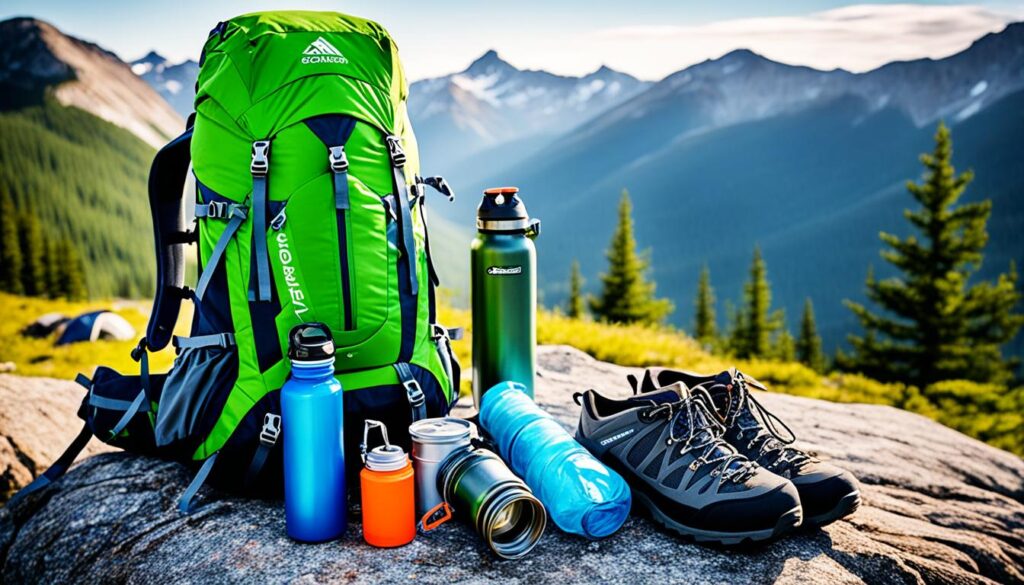
When it comes to lodging during your camping adventure, there are various options to consider. Each choice offers a different level of comfort and convenience, catering to different preferences. Let’s take a closer look at the advantages of tent camping and alternative lodging options:
| Lodging Option | Advantages |
|---|---|
| Cabins |
|
| Glamping |
|
| RVs |
|
When deciding between tent camping and lodging options, it’s important to consider your comfort level and the size of your group. If you’re new to camping or prefer the convenience of a fully equipped shelter, cabins or glamping can be great choices. On the other hand, RVs provide the flexibility of a mobile home, allowing you to explore different locations without compromising on comfort.
Regardless of your chosen lodging option, incorporating beginner camping gear and camping recipes for beginners can enhance your camping experience. Having the right gear will ensure that you are prepared for any situation, while delicious camping recipes will make mealtime enjoyable and memorable.
Remember, the choice between tent camping and alternative lodging ultimately depends on your personal preferences and camping goals. Consider the advantages of each option to make an informed decision that suits your needs.
Choosing a Location for Your First Camping Trip
When it comes to your first camping trip, one of the most critical tips I can give you is to choose the right camping location. The location you select can greatly impact the success and enjoyment of your camping experience. To ensure a memorable adventure, consider the following factors:
- Goals for the Trip: Are you seeking a relaxing getaway or an action-packed outdoor adventure? Consider your preferences and what you hope to achieve during your camping trip.
- Season: Different camping locations offer unique experiences depending on the season. Research the best time to visit certain areas to make the most of the weather and activities available.
- Accessibility: How far are you willing to travel? If this is your first camping trip, you might prefer a location closer to home to ensure convenience and flexibility.
- Amenities: Take into account the amenities available at the camping locations you are considering. Restrooms, showers, laundry facilities, and other conveniences can contribute to a comfortable experience, especially for first-time campers.
After considering these factors, you have two options: camping at a familiar location or exploring a new place. Camping at a familiar location close to home offers familiarity and convenience, making it an excellent choice for beginners. On the other hand, exploring a new place allows for new experiences and discoveries, broadening your camping horizons.
Before finalizing your camping location, don’t forget to check the weather forecast. Planning accordingly and being prepared for the conditions will ensure a safe and enjoyable camping experience.
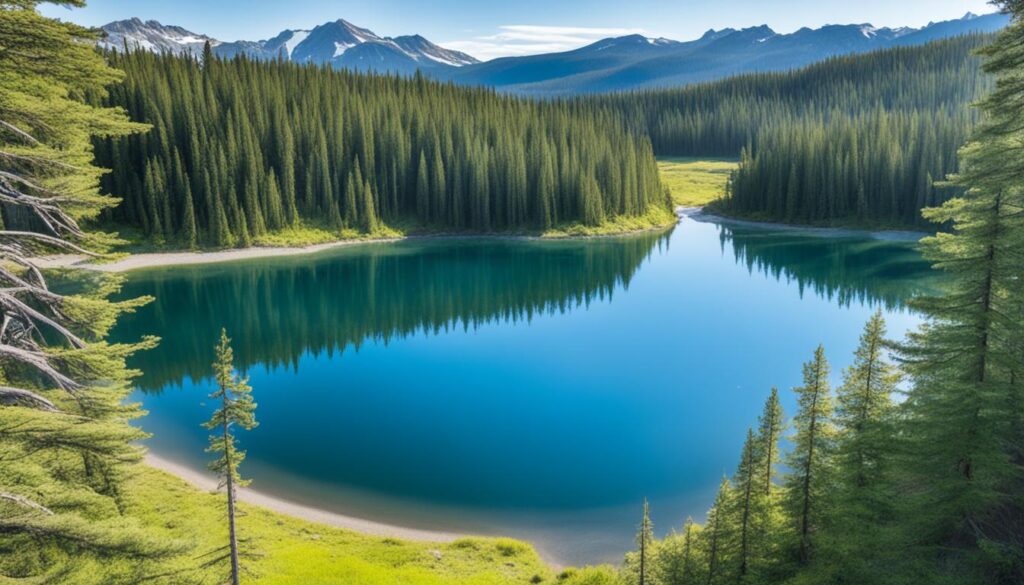
What to Know Before You Go Camping
Before embarking on your first camping trip, it’s essential to have a solid understanding of the basics. Knowing how to get started, what gear to bring, and how to camp responsibly will ensure a safe and enjoyable experience. Here are some beginner camping tips and essential camping gear for beginners to help you prepare:
1. Car Camping: A Beginner-Friendly Option
If you’re new to camping, car camping is recommended as it provides easy access to modern-day conveniences. With your vehicle nearby, you can bring more gear, food, and supplies to make your trip comfortable.
2. Research and Reserve Your Campground
Research various campgrounds that fit your needs and preferences. Consider factors such as location, available amenities, and nearby attractions. Once you find a suitable campground, make reservations in advance to secure your spot.
3. Familiarize Yourself with Campground Rules and Directions
Before heading out, familiarize yourself with the rules and regulations of the campground you’ll be staying at. This will ensure that you adhere to any guidelines or restrictions set by the management. Additionally, review the directions to the campground to avoid getting lost on your way.
4. Check the Weather Forecast
Prior to your trip, check the weather forecast for the camping area. This will allow you to pack appropriate clothing, gear, and supplies. Being prepared for the weather conditions will help you stay comfortable and safe during your camping adventure.
5. Bring the Right Gear: Camping Essentials
Having the right camping gear is crucial for a successful trip. Here are some essential items to include in your camping checklist:
- Tent: Choose a tent suitable for the number of campers and weather conditions.
- Sleeping bags and sleeping pads: Ensure you have proper insulation for a good night’s sleep.
- Cooking equipment: Portable stove, pots, pans, utensils, and plates for preparing meals.
- Food and water: Pack non-perishable food items and an adequate water supply.
- Flashlights or headlamps: Essential for navigating in the dark.
- First aid kit: Be prepared for any minor injuries or emergencies.
- Personal hygiene products: Toilet paper, soap, and hand sanitizer.
- Extra clothing and layers: Be prepared for changing weather conditions.
6. Practice Leave No Trace Principles
Responsible camping involves practicing Leave No Trace principles. This means being mindful of your impact on the environment and leaving the campsite in the same or better condition than you found it. Respect nature, avoid littering, and dispose of waste properly.
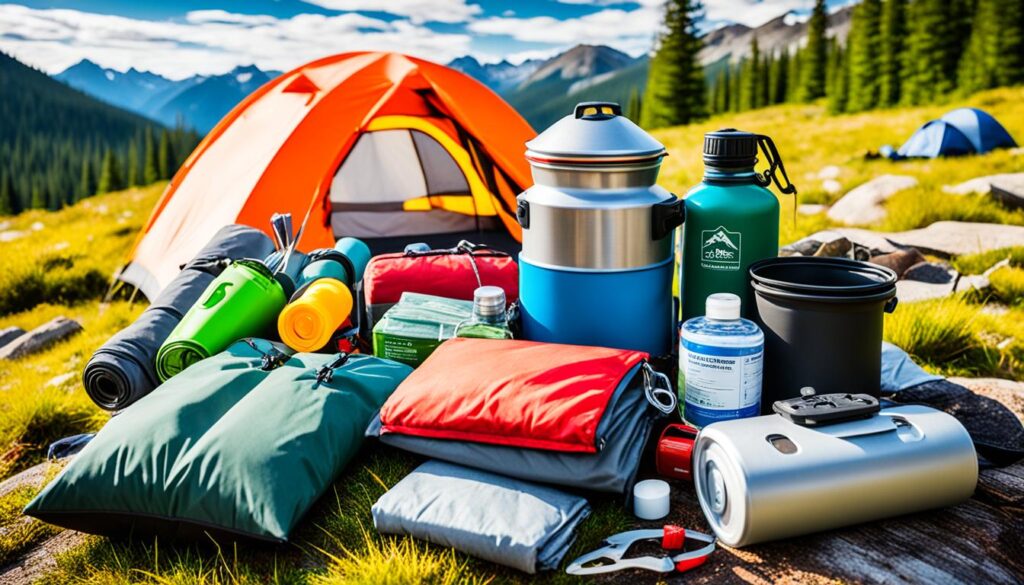
By following these beginner camping tips and packing the right gear, you’ll be well-prepared for your first camping trip. Remember to stay safe, respect the environment, and embrace the beauty of nature. Happy camping!
Camping Gear: What to Bring On Your Camping Trip
Packing the right gear is essential for a comfortable and enjoyable camping trip. As a beginner, it’s important to have the necessary camping essentials to ensure a smooth experience in the great outdoors. Beyond the 10 Essentials, which include navigation, sun protection, insulation, illumination, fire starter, repair kit, nutrition, water, emergency shelter, and a first aid kit, there are several other camping gear essentials to consider for your trip.
Camping Gear Checklist:
- Tent: Choose a tent suitable for your needs, considering the size, weather protection, and ease of setup.
- Sleeping bag and sleeping pad: Opt for a sleeping bag that suits the temperature range of your camping location. A sleeping pad provides insulation and comfort.
- Cooking equipment: Include a camping stove, cooking utensils, pots, and pans for preparing meals at your campsite.
- Food: Pack non-perishable items, snacks, and easy-to-cook meals. Don’t forget to bring a cooler to store perishable items.
- Toiletries: Remember to bring toiletries such as soap, toothpaste, toothbrush, toilet paper, and hand sanitizer.
- Camping chairs: Bring lightweight, foldable chairs for comfortable seating around the campfire.
When deciding which gear to bring, consider the specific needs of your camping trip. Research the weather conditions and activities you plan to participate in to ensure you have the appropriate gear. It’s also crucial to test your gear before your trip to make sure everything is in working order.
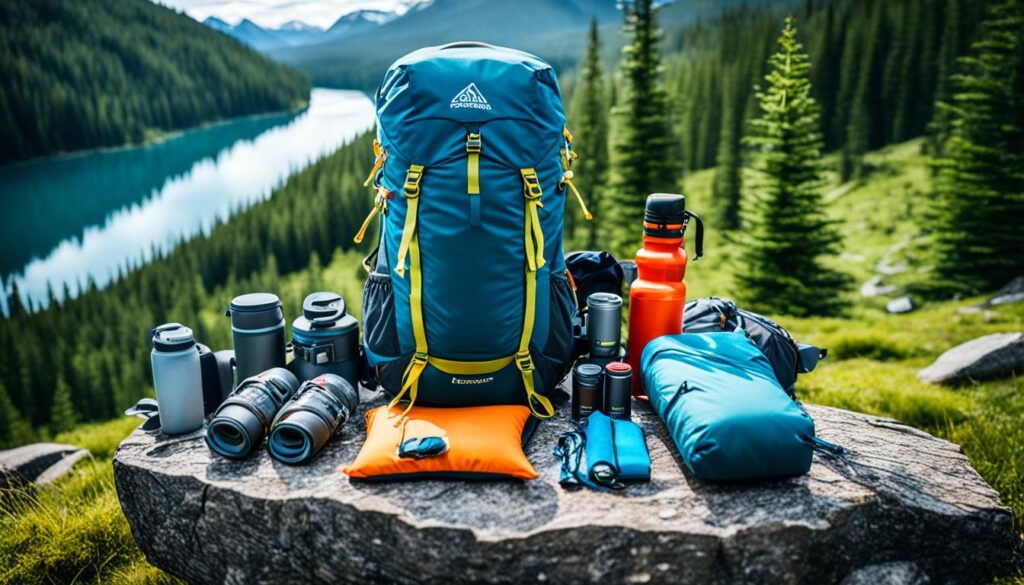
At Camp: Be Aware While You're There
While camping, it’s important to be aware of your surroundings, follow campground rules, and practice good camping etiquette. By doing so, you can ensure a safe and enjoyable experience for yourself and fellow campers.
One essential principle to keep in mind is to leave no trace – minimizing your impact on the environment and preserving the natural beauty of the outdoors. Dispose of waste properly by using designated trash bins and recycling facilities. Remember to pack out what you pack in, including food scraps and any items that could harm the environment or wildlife.
When it comes to campfires, minimize campfire impacts by using established fire pits, following any fire restrictions in place, and always fully extinguishing the fire before leaving. Make sure to use dead and downed wood for your fire and avoid damaging live vegetation.
Additionally, it’s important to be considerate of fellow campers. Respect quiet hours and keep noise levels to a minimum, especially during nighttime. Be mindful of your neighbors and avoid intruding on their personal space.
Prioritizing safety is crucial during your camping trip. Always check the weather forecast and be prepared for changing conditions. Ensure that your camping gear is in good condition and functioning properly before heading out. It’s also essential to have an emergency plan in place, including knowing how to access help in case of an emergency.
While enjoying your camping trip, engage in fun activities that strengthen bonds and create lasting memories. Gather around the campfire for storytelling sessions, roast marshmallows for delicious s’mores, and explore the surrounding nature through hikes and walks.
Remember, camping is an opportunity to connect with nature and experience the beauty of the great outdoors. By being aware of your surroundings, practicing good camping etiquette, and leaving no trace, you can make the most of your camping adventure while ensuring the safety and preservation of the environment.
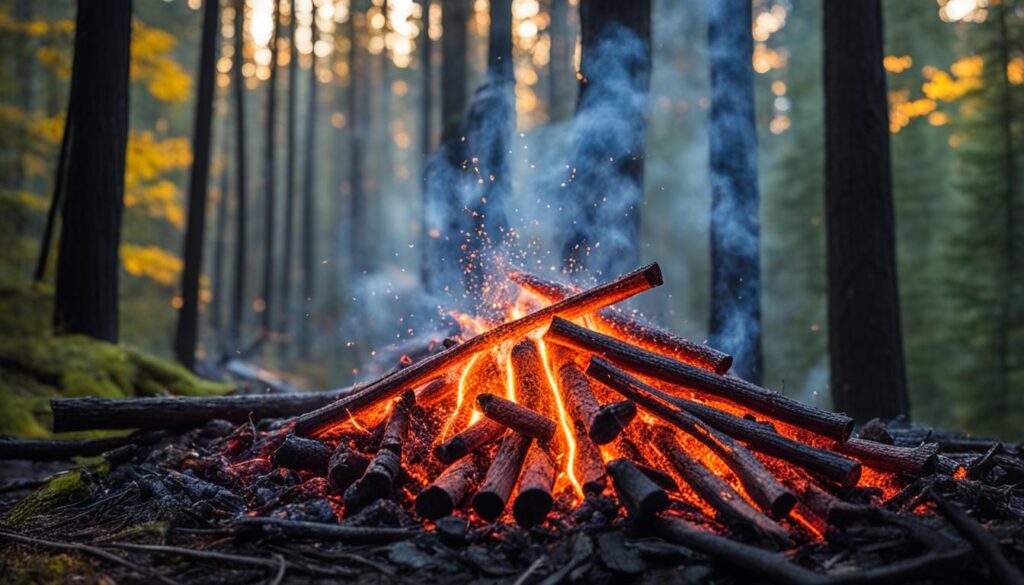
Food and Water
Food and water are essential for a successful camping trip. Planning your meals and bringing the right supplies will ensure you have enough sustenance throughout your outdoor adventure. Additionally, practicing food safety and proper water management are important for your health and wellbeing. Here are some tips and guidelines to follow:
Camping Recipes for Beginners
When it comes to camping recipes for beginners, simplicity is key. Opt for easy and low-maintenance meals that require minimal preparation and cooking time. Some popular options include:
- PB&J sandwiches: A classic camping staple that is quick to make and doesn’t require refrigeration.
- Hotdogs: Easy to cook over a campfire and loved by campers of all ages.
- S’mores: A must-have dessert made with marshmallows, chocolate, and graham crackers.
Camping Safety Tips
Ensuring the safety of your food and water is essential to prevent illness and attract animals. Here are some camping safety tips to keep in mind:
- Proper food storage and disposal: Keep perishable items in airtight containers or coolers with ice packs. Dispose of food waste in designated areas to avoid attracting animals.
- Hygiene practices: Wash your hands thoroughly with soap and clean water before handling food. Use clean utensils and avoid cross-contamination.
- Water management: Bring enough water for drinking and cooking. If camping in an area without potable water, use a filtration system or boil water to ensure it is safe for consumption.
Camping Essentials for Beginners
Aside from food and water, there are other camping essentials that every beginner should pack. These items will make your camping experience more comfortable and convenient:
- Camping stove or portable grill: Allows for easy cooking and meal preparation.
- Cooking utensils: Bring pots, pans, spatulas, and other necessary tools for cooking.
- Plates, bowls, and cutlery: Pack durable, reusable options to reduce waste.
- Camping table and chairs: Provides a comfortable dining area during your outdoor meals.
- Water containers: Bring reusable water bottles or jugs to store and carry water.
Remember to create a meal plan, pack non-perishable food items, and bring the necessary supplies for cooking and food storage. Prioritize food safety, practice good hygiene, and manage your water supply effectively. With these camping essentials, you can enjoy nutritious meals and stay hydrated throughout your camping trip.
Additional Camping Essentials
In addition to camping gear and food, there are other essential items to bring on your camping trip. These include:
- A hammer or mallet for tent assembly
- A sealable bin to store your camping gear and prevent animals from accessing it
- Trash bags for waste disposal
- A first aid kit for emergencies
- Sunscreen and bug spray for protection
- Comfortable clothing suitable for camping and outdoor activities
Remember to check the weather forecast and adjust your clothing accordingly. Packing these additional essentials will ensure a convenient and safe camping experience.
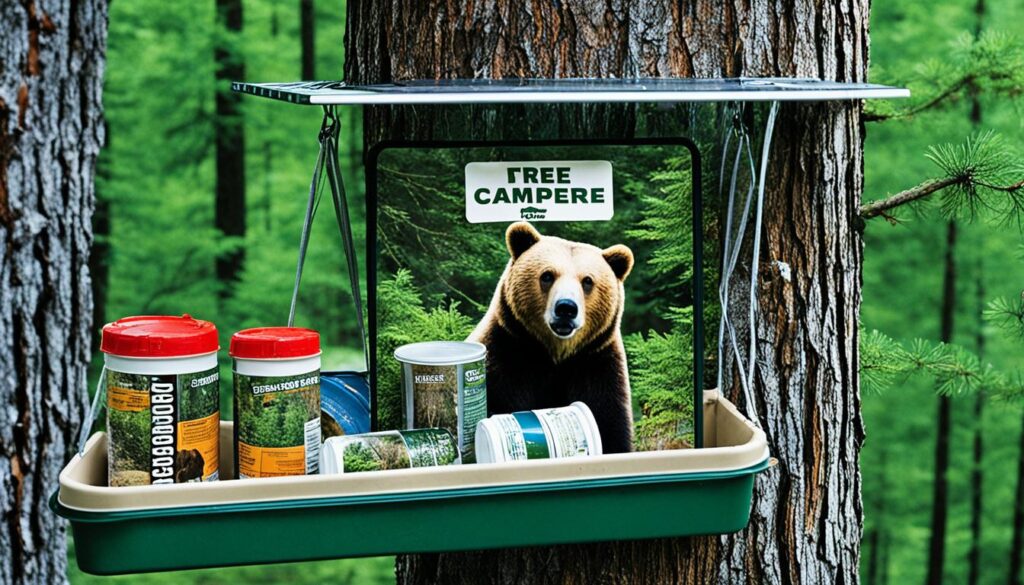
| Additional Camping Essentials | Why It’s Important |
|---|---|
| Hammer or Mallet | Essential for tent assembly, ensuring stability and proper setup. |
| Sealable Bin | Keeps camping gear organized, dry, and safe from wildlife. |
| Trash Bags | Facilitates proper waste disposal and helps maintain a clean campsite. |
| First Aid Kit | Provides necessary medical supplies for unexpected injuries or emergencies. |
| Sunscreen and Bug Spray | Protects your skin from harmful UV rays and prevents insect bites. |
| Comfortable Clothing | Allows for ease of movement and protection from changing weather conditions. |
Conclusion
Now that you have gained a wealth of knowledge and valuable tips for camping beginners, you are ready to embark on your first camping adventure! Whether you choose traditional tent camping or opt for alternative lodging options, safety, comfort, and enjoyment should be your top priorities. Remember to plan ahead, pack the right gear, choose a suitable location, practice Leave No Trace principles, and be aware of camping etiquette.
By following these essential guidelines, you can confidently explore the great outdoors and create lifelong memories. Camping for beginners is an exciting and rewarding experience. Embrace the beauty of nature, disconnect from the hustle and bustle of daily life, and immerse yourself in the serenity of the wilderness.
So, gather your camping gear, choose a destination that suits your preferences, and set out on your first-time camping adventure. Whether you are camping alone, with a partner, or alongside your family and friends, the joy and sense of freedom that camping provides are unmatched. Happy camping!
FAQ
What are some camping tips for beginners?
Some camping tips for beginners include starting with car camping, researching campgrounds and amenities, practicing Leave No Trace principles, and following campground guidelines. It’s also important to bring the right gear and plan your meals and activities ahead of time. Additionally, familiarize yourself with basic camping safety tips to ensure a safe and enjoyable experience.
How do I pitch a tent correctly?
To pitch a tent correctly, start by choosing a level spot for pitching, be mindful of tent stakes, and always use a tarp for added protection. Depending on the type of tent you own, the assembly process may vary. It’s also a good idea to make your tent more comfortable with additional accessories like a window for airflow. Following camping safety tips and guidelines is essential, especially for first-time campers.
What is the difference between tent camping and lodging options?
Tent camping involves staying in a portable and adaptable shelter, while lodging options provide fully enclosed accommodations with furnishings. Tents are a popular beginner-friendly option due to their portability and versatility. Lodging options like cabins and glamping offer unique and luxurious camping experiences, while RVs provide the convenience of a home on wheels. When choosing between tent camping and lodging, consider your comfort level, group size, and preferences.
How do I choose a location for my first camping trip?
When choosing a location for your first camping trip, consider your goals, the season, and the accessibility of the campsite. Research camping locations and amenities, such as restrooms and laundry facilities, to ensure a comfortable experience. Camping at a familiar location close to home offers convenience and flexibility, while exploring a new place allows for new experiences. Always check the weather before your trip and plan accordingly.
What should I know before going camping?
Before going camping, it’s important to know how to get started, what gear to bring, and how to camp safely and responsibly. For beginners, car camping is recommended as it allows for easy access to modern-day conveniences. Research campgrounds that fit your needs, make reservations in advance, and familiarize yourself with the campground rules and directions. Bringing the right gear, including camping essentials, is vital for a successful camping trip. Practice Leave No Trace principles and follow campground guidelines to ensure safety and the preservation of the natural environment.
What gear should I bring on my camping trip?
When packing for your camping trip, it’s important to bring the necessary gear for a comfortable and enjoyable experience. Start with the 10 Essentials, which include navigation tools, sun protection, insulation, illumination, fire starter, repair kit, nutrition, water, emergency shelter, and a first aid kit. Additionally, bring camping gear essentials such as a tent, sleeping bag, cooking equipment, food, toiletries, and camping chairs. Consider the specific needs of your trip, the weather conditions, and the activities you plan to engage in.
What should I be aware of while camping?
While camping, it’s important to be aware of your surroundings, follow campground rules, and practice good camping etiquette. Follow Leave No Trace principles to minimize your impact on the environment and respect wildlife. Dispose of waste properly, minimize campfire impacts, and be considerate of other campers. Prioritize safety by checking the weather, ensuring your gear is in good condition, and having an emergency plan in place. Enjoy your camping trip by engaging in fun activities like storytelling, roasting marshmallows, and exploring the great outdoors.
What food and water should I bring on my camping trip?
Plan your meals and bring non-perishable food items, snacks, and cooking supplies. Consider easy and low-maintenance meals like PB&J sandwiches, hotdogs, and s’mores. Bring enough water for drinking and cooking, and have a water filtration system if needed. Practice proper food storage and disposal to avoid attracting animals. Ensure food safety by following hygiene practices and using clean water for cooking and cleaning.
What additional essentials should I bring on my camping trip?
In addition to camping gear and food, there are other essential items to bring on your camping trip. These include a hammer or mallet for tent assembly, a sealable bin to store your camping gear and prevent animals from accessing it, trash bags for waste disposal, a first aid kit for emergencies, sunscreen and bug spray for protection, and comfortable clothing suitable for camping and outdoor activities. Remember to check the weather forecast and adjust your clothing accordingly.
